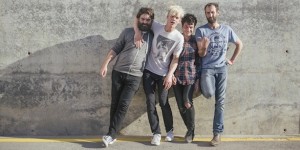Preoccupations throw caution to the wind
by Luke Ottenhof
October 6, 2016
The artists formerly known as Viet Cong have grown after a tough year.
Amidst the industrial, nail-biting chug of “Degraded,” the fifth track on Calgary post punk outfit Preoccupations’ freshly released record, singer and bassist Matt Flegel’s haunting admissions cut through the dirge: “We’re throwing caution to the wind/We are consistent in our flaws/Predictably, we have no goals.” These firm declarations can be interpreted one of two ways: they’re either a thesis statement, or a lack thereof. They’re either a band saying what they’re about, or shirking the idea of being about anything to begin with. Building something new or burning it down. Or maybe neither.
“When we were titling the songs [for this record], we had a bunch of conversations about how you name a song something, but then when you make a setlist, you make some abbreviate version of what that song is called. [Vocalist] Matt [Flegel] was just like, ‘We should just do them all one word,’” explains guitarist Scott “Monty” Munro. “So it kind of looks like a setlist. Plus, it kind of looks like a shitty poem.”
Munro grins and sips a Philips Blue Buck ale in a nursery-blue dressing room below Vancouver’s aching Rickshaw Theatre. He explains how the band, formerly known as Viet Cong, got their new moniker from a list of names that friend and former collaborator Chad Vangaalen sent over. He chuckles at the concept of releasing each new record under a different mantle: “I’d be fully into that as a thing,” he says earnestly. But he changes gears.
“I wouldn’t want to say that in a way that makes light of why we changed our name this time.”
The band came under fire for their ill-advised use of the nickname for Vietnam’s National Liberation Front, who committed atrocities against Vietnamese people for more than 20 years.
The name, itself a contraction of “Vietnamese communist,” struck particular anger and frustration in communities of Vietnamese North Americans, including refugees of the war itself who took to picketing and protesting outside Viet Cong shows to shame the insensitivity and erasure displayed by the band, however unknowingly. Munro is quick to assert these experiences as integral to not just the band’s growth, but his own. Social awareness isn’t an easy state to achieve, and it ought to be noted that due to those protesters’ resilience, courage and patience, a bit more of it exists.
“I grew up with the Vietnam War just as, like, a Hollywood thing,” admits Munro sheepishly. “Before this I’d never really thought that much about the refugees from the Vietnam War, which there were a lot [of].
“The people that were protesting the shows were a lot of people who had actually fled that war. It was like [elderly] people picketing the shows, so I felt like it was good to have a conversation with people who had actually fled that, cause it did change my perspective on what it meant, and what it meant to people that weren’t me. I do believe that was a worthwhile thing that we went through.”
Viet Cong name protest outside of Lee’s Palace. Credit: NOW Magazine
The band announced the name change in April, and immediately found themselves squarely on the other side of a double-edge sword wielded by rightwingers bemoaning the victory of ‘PC culture.’ Pop on over to the band’s YouTube channel to hear about how ‘spineless’ it was of them to change their name; announces one keyboard crusader/punk defender, “changing their name made them significantly less punk… The fact that they caved DOES mean I care less about what they have to say.”
The thing is, the name wasn’t the cause, and this wasn’t about PC culture to begin with. It was about Vietnamese culture.
“It had nothing to do with PC culture and more to do with directly meeting people that were affected by that conflict, and deciding that that wasn’t our intent, to bring that conflict up again.
“With this, I feel like I can stand behind our decision to do it,” he posits.
The new record plays as more contemplative and self-conscious than its predecessor. Mostly gone are the frenetic slashing of “Silhouettes” and the violent stutter-step of “Bunker Buster.” Flegel’s lyrics tend towards the more blunt and heavy-handed: “Destroy and cast away/blue translucent days/relapse and ricochet,” he howls on “Monotony,” over the band’s thick, industrial brooding. The quartet has never been a beacon of optimism and hope, but here they appear even further withdrawn, exploring musical and lyrical recesses to haunted depths.
“We definitely all went through some stuff this year,” Munro ponders. “Matt and I both had long-term relationships end. A lot of it is pretty directly from personal experience.”
The knee-jerk reaction has been to assume that the record deals directly with the fallout generated from their old name, but Munro is quick to clarify. “I don’t think he wrote anything specific about any of the protests. Some of those lyrics date back four years. There’s no point commenting on that in the lyrics of the songs either, cause then you’re just constantly bringing it up again.”
Day jobs that the band held down during the album’s creation coloured the record’s content as well. Flegel and Munro agree that working mindless jobs make writing music a more dire and urgent task, almost in an escapist way. “Although, it sort of depends on the job,” notes Munro. Musicians are a rare breed that are cornered into working a transient job that threatens your ability to pursue your career, but it’s a necessity; without that income, you couldn’t have that career. Munro remembers that Flegel’s job at a flooring factory took a particularly unpleasant toll.
“He’d go and unload tiles, and he was getting these cysts all over his fingers and having crazy arthritis. When we were recording some of the demos, there was time when it would just be Matt and I in the studio, and then I’d just play everything cause his hands were fucked for a while,” he recalls.
“I was delivering cupcakes, so my hands were fine. You work somewhere for a long time, and maybe your creative output is up, but then you can’t play guitar when you get home cause you’re fucked up physically from working a labour job. I built houses for a couple years, and I fell into an open basement and broke my hand.” He winces, and admits he never built houses again.
Munro has been a pillar in the Calgary music scene for more than a decade, collaborating with Chad Vangaalen, Reuben Bullock’s Reuben and the Dark, and many more. He and friend Chris Dadge, another integral local hold-steady, launched local record label Bug Incision in 2005 to house their free improvised releases, with Dadge going on to expand the label into a concert series for local musicians. Munro has even taught scores of budding guitarists in the city at the now-defunct Sak’s Music. For Munro, fostering music in the city was do-or-die.
“The only options are, it doesn’t happen, or you do it yourself,” he explains. “That definitely fosters some will to do things, cause there’s just no other option. Plus I like how in those scenes, everybody sort of rallies around any band that they’re friends with.”
People tend to mourn any Canadian music scene in contrast to Toronto’s or Montreal’s, but the smaller, less developed scenes offer unique opportunities that the more well-oiled ones don’t. “I think once the scenes get a little bigger, it gets a little more clique-y. You get a little bit more shoe-horned once it gets a little bit more solidified.”
But Munro is quick to temper this optimism with a somber spoonful of geographical reality. “I think honestly that’s the worst part about Calgary as a music city: it’s not a great city to tour from. I remember playing in bands in my teens and early 20s and just struggling to get a show in Edmonton, struggling to get a show in Lethbridge; playing Regina, and it sucking.”
It’s a life that Munro, like many other starry-eyed nihilists musicians, are dedicated to — often to a selfless, borderline masochistic degree.
“I would take a better record over a better year,” Munro decides when asked if he’d rather have a happier life or a stronger creative output, the implication being that a brighter life doesn’t offer as much to write about. “I don’t think that’s necessarily a good idea, but at this point in my life, I don’t really have a home life. I’m sort of perpetually homeless. I just get an Airbnb between tours, or go visit my sister for a week.
“It’s not necessarily the most fun thing to do… But I don’t know what else I’d do. I’ve never been into doing anything else in my life.”
Tags: Music, Featured, Interviews, preoccupations, Viet cong






